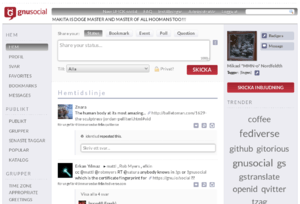GNU social
GNU social (previously known as StatusNet and once known as Laconica[4]) is a free and open source software microblogging server written in PHP that implements the OStatus standard for interoperation between installations. While offering functionality similar to Twitter, GNU social seeks to provide the potential for open, inter-service, and distributed communications between microblogging communities. Enterprises and individuals can install and control their own services and data.[5][6]
 | |
 Screenshot of a GNU social website with Swedish localization. | |
| Original author(s) | Evan Prodromou |
|---|---|
| Developer(s) | Diogo Cordeiro and GNU social Developers |
| Stable release | |
| Preview release | |
| Repository | |
| Written in | PHP |
| Operating system | Cross-platform |
| Available in | More than 25 languages.[2] |
| Type | Web application framework |
| License | GNU Affero General Public License[3] |
| Website | gnusocial |
GNU social has been deployed on hundreds of interoperating servers.[7]
Features
Standard features
- Publish updates via an XMPP/Jabber client[8]
- OpenID provider and authentication
- Federation support via the OStatus protocol
- Subscriptions via PubSubHubbub
- Replies via the Salmon protocol
- Microformat semantic HTML of profiles and notices[9][10]
- A Twitter-compatible API
- Categorization using hashtags
- Groups, using bangtags
- Localization and translations of UI (using Gettext)
- Automatic, self-hosted URL-shortening
- Attachments (add files, images, video, audio to dents)
- Attached media files available in podcast format
- Embedding of content from other sites, like YouTube, Flickr, etc.
Available features
- Webmention and Pingback communication with IndieWeb sites[11]
- Geolocations and maps
- SMS updates and notifications
- Cross-posting to Twitter
- Live update of stream
History
GNU social was spun out of the GNU FM project. The founder was Matt Lee and the early developers were fellow FSF employees, Donald Robertson and Deborah Nicholson.
StatusNet deployment based on the formerly known as Laconica was the Identi.ca open-microblogging service. Hosted by original StatusNet creators StatusNet Inc., Identi.ca offered free accounts to the public and serves as the co-flagship (along with freelish.us) for the installable version of StatusNet. The site has migrated to pump.io.
Version 0.9.0, released March 3, 2010, added support for OStatus, a new distributed update standard superseding OpenMicroBlogging.[12][13]
June 8, 2013 it was announced StatusNet would be merged into the GNU social project, along with Free Social.[14]
The service is interoperable with other OStatus platforms.[15]
Names
StatusNet was renamed from Laconica coinciding with the release of version 0.8.1 (a.k.a. "Second Guessing") of the StatusNet software.[16]
StatusNet's name "simply reflects what our software does: send status updates into your social network."[4]
Laconica's name was a reference to the Laconic phrase, a particularly concise or terse statement the likes of which are famously attributed to the leaders of Sparta (Laconia being the Greek region containing Sparta). In microblogging, all messages are forced to be very short due to the ~140 character tradition on message size, thus they are all de facto laconic phrases.
The GNU in the name refers to the GNU Project.
See also
References
- Nordfeldth, Mikael (25 Oct 2014). "GNU social XSS vulnerability, version bumped to v1.1.2". social-discuss (Mailing list). Retrieved 2015-10-11.
- "Translating:GNU social localization". Retrieved 2015-02-08.
- "README file". Archived from the original on 2014-11-03. Retrieved 2015-02-09.
...under the terms of the GNU Affero General Public License as published by the Free Software Foundation, either version 3 of the License, or (at your option) any later version.
- Laconica is now StatusNet "Archived copy". Archived from the original on 2009-08-31. Retrieved 2009-08-31.CS1 maint: archived copy as title (link), retrieved 2009-10-04
- Terdiman, Daniel (2008-10-6) Taking on Twitter with open-source software, CNet. Retrieved 2009-1-3.
- Bastien, Malcolm (2008-8-28) Why Laconica Means Big Things For Corporate Micro Blogging Archived 2009-01-25 at the Wayback Machine. Retrieved 2009-1-3.
- "Self-Hosting GNU Social". www.codeword.xyz.
- "[uf-discuss] Open microblogging and microformats". Microformats.org. Retrieved 2018-10-03.
- GNU social. "GNU social - IndieWeb". Indiewebcamp.com. Retrieved 2018-10-03.
- "Accept mentions/replies/rsvps/likes via pingback and webmention (!41) ¡ Merge Requests ¡ gnu.io / gnu-social ¡ GitLab". Git.gnu.io. 2015-10-22. Retrieved 2018-10-03.
- "StatusNet 0.9.0". Archived from the original on July 17, 2012.
- "StatusNet 0.9.0 Released". Archived from the original on July 20, 2012.
- "GNU social". 2013-06-08.
- "tootsuite/mastodon". GitHub. Retrieved 2017-01-11.
- StatusNet 0.8.1 (2009-8-28) "Archived copy". Archived from the original on 2013-01-12. Retrieved 2013-01-12.CS1 maint: archived copy as title (link), StatusNet Wiki Retrieved 2009-8-29.
External links
| Wikimedia Commons has media related to GNU social. |